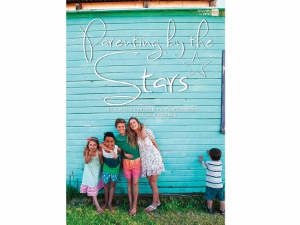
Launched to mark Dyslexia Advocacy Week, all profits from sales of the book will go to Dyslexia Foundation of New Zealand (DFNZ).
Parenting By The Stars features advice from a wide range of well-known New Zealanders, including Lady Pippa Blake, Sir Ray Avery and Sir Peter Leitch (the Mad Butcher), Eco store founders Malcolm and Melanie Rands, parenting experts Nigel Latta and Diane Levy, chefs Mike Van De Elzen, Nadia Lim and Brett McGregor, TV presenters Rawdon Christie, Toni Street, Pio Terei, Kate Rodger and Jacquie Brown, and sportspeople Michael Campbell, Barbara Kendall and Bernice Mene.
Marketing executive Anne Marie Spicer had been nursing the idea of a new kind of parenting book as fundraiser when she met writer Paula Trubshaw. She loved the idea and the pair decided to bring the book to life.
“Parenting is a wonderful role but there’s no doubt it has its challenges. When my children were younger, and after one of ‘those days’, I’d go to bed wondering what other people would do if presented with the particular situation I’d been in that day,” Ms Spicer says.
“When it came to putting this book together, we decided to ask well-known New Zealanders to tell us what parenting is really like for them and what they’ve learned and wanted to share along the way.
“Contributors were more than happy to provide tips, funny stories, family photographs and even favourite family recipes and all contributions have been down to earth, honest, inspirational and funny. Most of all, they show that when it comes to parenting there is no right or wrong path,” she says.
DFNZ was chosen as the recipient charity because its work has far-reaching impact for families and the community. “We hope funds raised will help the foundation continue its important work helping New Zealand children with different learning preferences get an equal start in life, which in turn supports schools, families and society in general,” Ms Spicer says.
DFNZ chair of trustees Guy Pope-Mayell says DFNZ is honoured to be involved.
“We are thrilled to have the opportunity to benefit from what is such an exciting project. Interestingly several of the contributors are also dyslexic, which speaks to the fact that it is widespread in New Zealand,” he says.
“Conservative estimates are that one in 10 Kiwis are dyslexic. While this is often seen as just a problem with reading and writing, it can affect a spectrum of skills including motor skills, cognitive processing speeds and comprehension, auditory and visual perception, planning and organising, and short-term memory and concentration,” he says.
“This has far-reaching impacts. Often, dyslexia’s greatest difficulty is self-esteem – it only becomes a disability if not appropriately addressed. In this instance, the consequences can be everything from disruptive classroom behaviour through to anti-social behaviour, truancy, depression, drug use and crime.
“Yet dyslexia is one of the few causes of social dysfunction that can be easily addressed. By prioritising and addressing dyslexia in schools – and ensuring that schools deliver on the legal rights that these students have to accommodations – we avoid flow on adult-related expenses from social services and mental health services through to the huge costs of incarceration in prisons,” he says.
Dyslexia Advocacy Week (March 16-22) is centred on youth rights in the classroom and in the courts. In the classroom, this is about improving the dyslexic student’s experience and achievements by ensuring that legal rights to inclusive learning and accommodations such as reader or writer assistance, computer use, or extra time are delivered on. In the courts, getting it right is about ensuring dyslexic youth are not entrapped in a system that treats them unfairly as adults. For a young person with learning differences that render them ill-equipped to understand and deal with the justice system, DFNZ contends the default should be a family-inclusive, restorative approach. In line with this, DFNZ is backing calls to raise the Youth Court age from its current level of 16 years. DFNZ also wants to see changes to the Statement of Facts prepared by the prosecution for sentencing purposes.
Find out more about Dyslexia Advocacy Week at http://www.dyslexiafoundation.org.nz/daw2015/
Parenting By The Stars, $29.99 is available for purchase online at www.parentingbythestars.co.nz and at selected Paper Plus stores.
The much-delayed English draft curriculum is now out for consultation, generating discussion from teachers.
Research from AUT demonstrates arts, culture and recreation have positive impacts on all aspects of…
How effective has the school phone ban been in achieving its aims? Researchers from the…
School camps and excursions deliver hands on learning experiences, helping to consolidate classroom learning.
Innovations in AV technologies present new opportunities to engage with students. We look at how…
A new report from the University of Auckland’s Our Voices Project asks young people what…
This website uses cookies.